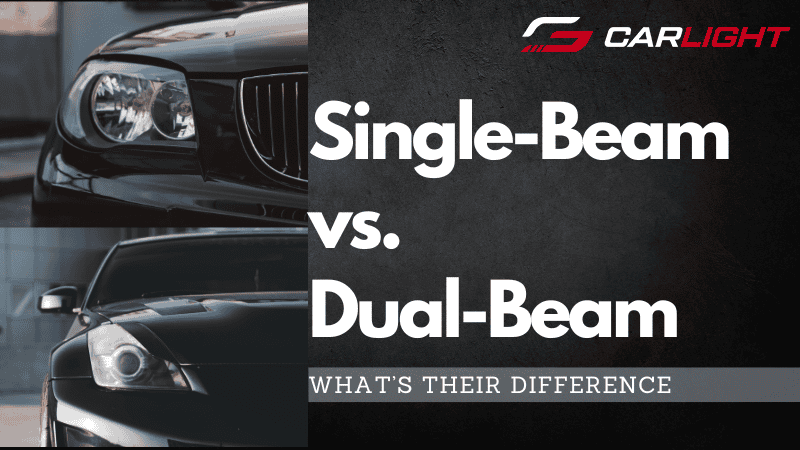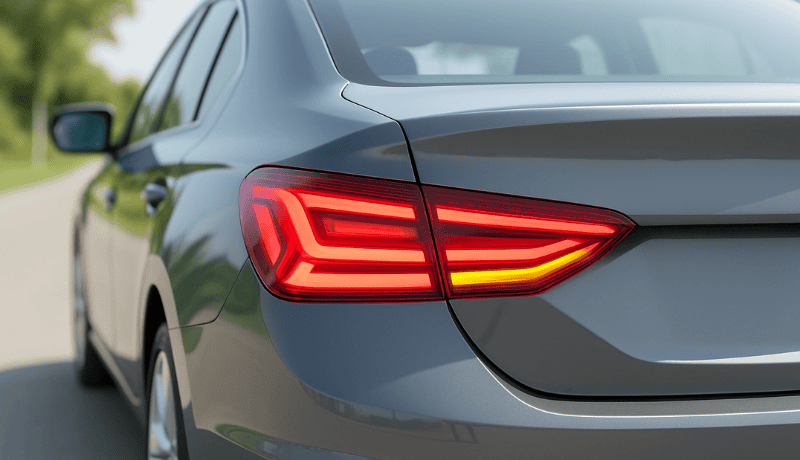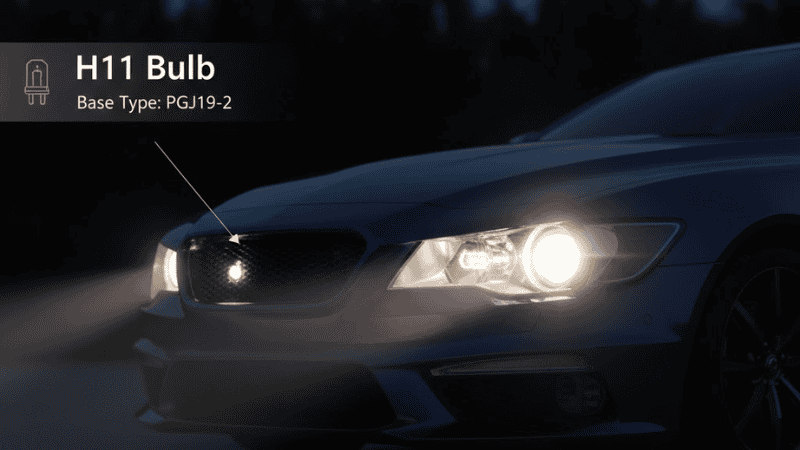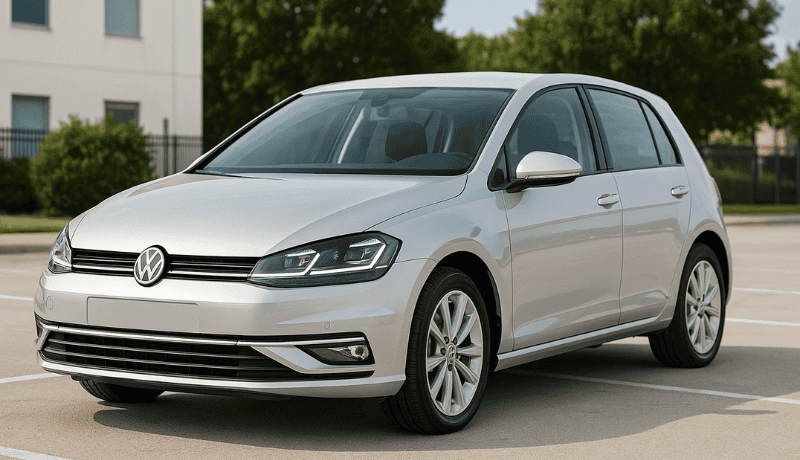Do you know what’s the distinction between single-beam and dual-beam headlights? In this blog post, you’ll learn about single and dual-beam headlights.
Many vehicle owners get perplexed when it comes to picking the right headlight configuration. With our extensive experience in the vehicle lighting field, we comprehend the two types of headlights. We can guide you through the differences and the right choice for your car.
Ready to explore single-beam and dual-beam headlights? Let’s get started.
Understanding Single-Beam and Dual Beam Headlights
What are Single-Beam Headlights?
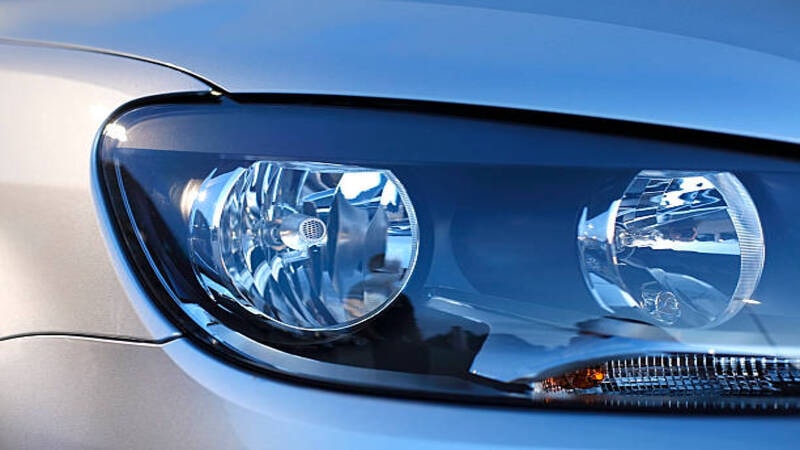
Single-beam headlights are a headlight configuration that features a single filament. The filament is designed to produce either a low or high beam. That’s why this system needs two bulbs, one for low-beam light and the other for high-beam light. Each bulb has a dedicated reflector and projector for focusing and orienting the light.
What are Dual-Beam Headlights?
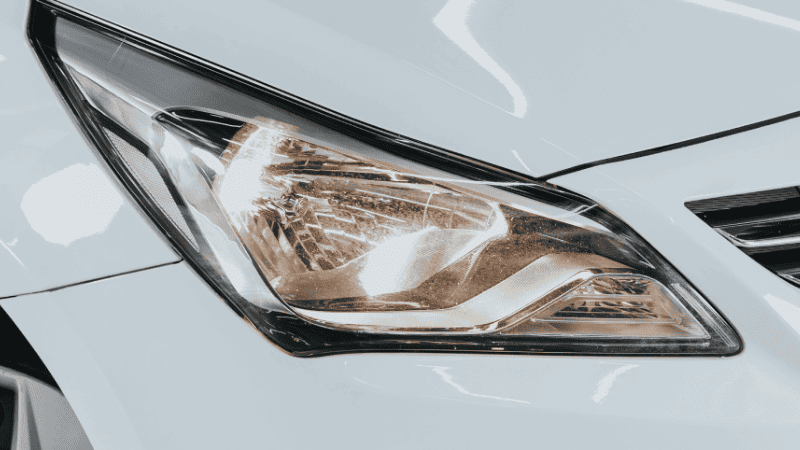
Dual-beam headlights involve two filaments in a single setting. This innovative approach integrates high and low-beam functions into a single housing. These headlights have a single illumination source for delivering two distinct lighting modes. They utilize a unique assembly of movable shields, adjustable reflectors, or dual filaments within the same bulb.
How Single Beam Headlights Work?
Single-beam headlights involve the installation of two bulbs in the headlight assembly. This configuration involves a separate bulb for a single type of light beam. The separation of function leads to a simple design. It also involves the replacement of separate bulbs for efficient emission of low and high beams. However, single-beam headlight bulbs might need more components for smooth operations. In addition, each bulb must match the specific size and design requirements of the vehicle’s headlight assembly.
How Dual Beam Headlights Work?
Dual-beam headlights work by utilizing a single bulb to produce two types of light beams. The bulb has a unique mechanism that enables you to shift between high and low beams. The dual functionality eliminates the need for additional bulbs for each type of beam. One filament generates a wide, less intense low beam to illuminate a limited area ahead. The other filament produces high-intensity and focused high beams to illuminate an extensive area. Dual-beam headlights offer flexibility by enabling you to switch between the two lighting modes.
Main Differences Between Single Beam and Dual Beam Headlights
Single and dual-beam headlights are known for their specific functionalities. The following are the distinct features of the two types of headlights:
| Aspects | Single-Beam Headlights | Dual-Beam Headlights |
|---|---|---|
| Functionality | Use one filament to emit a single light beam. Offers focused and bright lighting | Two filaments for emitting two light beams. Offers optimal brightness of each light |
| Number of Bulbs | Two bulbs for two light beams | One bulb for both light beam |
| Design and Mechanism | Simple design | Complicated design |
| Installation Complexity | Complex installation | Convenient Installation |
| Application | Older vehicle models | Modern vehicle models |
| Cost | Affordable | Expensive |
Functionality
Single-beam headlights are specialized to provide a single lighting mode. They provide a low beam for nearby illumination or a high beam for enhanced distant visibility. A single-beam headlight relies on two bulbs to deliver light beams.
It ensures that each beam functions independently. The two bulbs work in such a way that only one of them operates at once. Operating the low-beam bulb will automatically turn off the high-beam bulb. Similarly, if you switch the high-beam bulb on, the low-beam bulb automatically goes out.
On the other hand, a dual-beam headlight system offers high and low beams via a single bulb. It utilizes a unique assembly of movable reflectors and adjustable filaments that shift to modify the beam pattern. The feature to shift between the two modes offers you convenience and adaptability to changing road conditions. This unique integration also minimizes the number of bulbs required for safely driving on the road.
Number of Bulbs Required
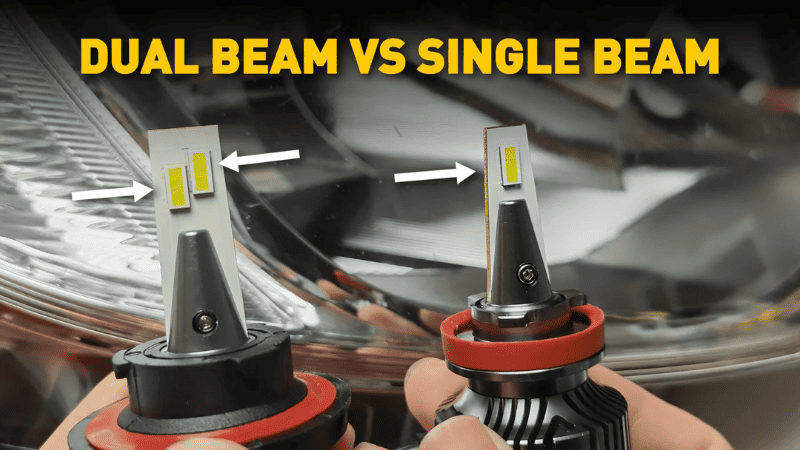
The single-beam headlight system involves two bulbs. One bulb is allocated for the high beam, while the other offers the low beam. This dual-bulb setup requires four bulbs for an operational headlight system.
This configuration ensures optimal performance for each type of beam. However, it also doubles the maintenance requirement. Sometimes, bulbs for low and high beams experience uneven wear. It means you need to replace some bulbs earlier than others. The uneven wear can also cause inconsistent lighting.
On the other hand, dual-beam systems employ a single bulb to produce high and low beams. They need fewer bulbs. This headlight system minimizes the maintenance cost and the frequent need to replace the bulb. In addition, it simplifies your vehicle’s lighting system. Fewer components make the installation and maintenance accessible. A lesser bulb count offers you more design flexibility, offering your vehicle sleek and minimalist aesthetics.
Design and Mechanism
Single-beam headlights have a simple design, with each bulb dedicated to a particular beam type. Their straightforward design leads to convenient manufacturing and reliability. However, this feature has a downside when you frequently switch between low and high beams. Moreover, you need additional space to house separate bulbs for each beam type. This design is unsuitable for compact vehicles, which may struggle to accommodate larger headlight assemblies.
In contrast, dual-beam headlights have a complex setting where a bulb performs dual functions. They have a single large movable reflector and two filaments to change the direction and intensity of the light. The wiring of dual-beam headlights is also less complex. It minimizes the risks of electrical issues. The straightforward wiring also makes the troubleshooting easy.
Installation Complexity

Proper installation is crucial for the accurate performance of headlight bulbs. Single-beam headlights involve complex wiring. The need to fit two bulbs in a headlight housing results in a complicated installation procedure. You need extra wiring and connections to accommodate the dual bulb design. It is more time-consuming and intricate. The accommodation of two bulbs in a single headlight housing is also a challenge. In addition, you need to ensure proper alignment and functionality for both bulbs. It adds to the complexity of installing single-beam headlight bulbs.
In contrast, installing dual-beam headlights is less complex than single-beam headlights. Their unique design reduces the number of components and connections. You can complete its user-friendly installation in a short time. It also involves less effort as it has fewer alignment adjustments. A study says that headlights involving a single bulb for high and low beams have less mechanical complexity. In addition, dual-beam headlight bulbs have reduced the potential for installation errors.
Applications
Single-beam headlights are employed in various old car models, as well as in old trucks and motorcycles. In contrast, dual-beam headlights are installed in advanced vehicle models. Luxury cars also have dual-beam headlights. Their simple installation and ease of replacement make them a preferable choice.
Advantages and Disadvantages of Single Beam Headlights

Pros
Single-beam headlights offer the following benefits:
- Single-beam headlights offer better lighting quality as each bulb emits a particular light beam. You can replace any bulb if it’s not working properly.
- They are less expensive compared to dual-beam headlights.
- In this system, each bulb operates to emit a specific light beam. It makes it more energy-efficient.
Cons
Single-beam headlight bulbs also have some downsides. Here are some of them:
- They have complex installation due to the involvement of separate bulbs for high and low beams. It makes the installation process more expensive.
- They are less convenient as you need to switch between two beams manually.
Advantages and Disadvantages of Dual Beam Headlights

Pros
The following are some benefits of using dual-beam headlights:
- Dual-beam headlights involve fewer bulbs and wiring. It makes them easier to manage. This design enables you to switch between high and low beams.
- This system involves one bulb for performing both functions. It reduces the need for replacement for replacing the bulbs separately to maintain the performance.
- Their compact design makes them space-efficient. They need less space than single beams to accommodate one bulb.
Cons
The following are some drawbacks of dual-beam headlights:
- They have complex technology and integrated design. These attributes impact the light quality and lead to their higher price tag.
- The light may not be as bright as offered by single-beam headlight bulbs.
Choosing Between Single Beam and Dual Beam Headlights

It would be best if you considered several aspects while selecting between single and dual-beam headlights. The following factors will help you pick a suitable headlight for your vehicle:
Light Output and Beam Pattern
You need to access your illumination requirement for your driving conditions. Single-beam headlight bulbs offer more focused lighting. They have a dedicated bulb for each beam. Their reflectors are manufactured to emit a single beam pattern.
Durability and Maintenance
You can maintain single-beam headlight bulbs more conveniently. The separate bulbs are easy to replace if they fail. However, they are not very durable and are prone to electrical errors. In contrast, dual-beam headlight bulbs are more long-lasting.
Vehicle Compatibility
Check your vehicle’s existing headlight system. Some vehicles are designed for single-beam headlights, while some require dual-beam configuration. You can also check the vehicle owner manual to learn about the compatible configuration.
Driving Habits
For frequent nighttime or off-road drivers, the focused light of single beams might be more beneficial. However, the convenience of dual beams could be more appealing for urban or occasional drivers.
Technology Preference
Modern LED headlights, halogen bulbs, and HID light bulbs are available for both types. If energy efficiency and longevity are priorities, consider these advanced lighting technologies.
Identifying Your Headlight Type
Identifying your vehicle’s headlight type is crucial for clear visibility. The following aspects can help you identify the right headlight type:
- Headlight bulbs have shortcodes that help you determine their type. American National Standards Institute (ANSI) set them. These codes indicate whether the bulb is single or dual beam. Cross-referencing this code with manufacturer specifications can confirm your bulb type.
- Go through the vehicle’s user manual. It will provide you with detailed information about the headlight system. Look for the section on lighting or bulb replacements.
- A thorough physical inspection of the headlight assembly can also aid in determining the type.
- If you are not sure which bulb type you should choose, get assistance from a professional mechanic. They can quickly identify the headlight type and recommend the appropriate replacement.
Frequently Asked Questions

What is the main difference between dual and single-beam headlight bulbs?
Single-beam bulbs have separate high and low-beam bulbs. On the other hand, dual-beam bulbs rely on a single bulb to generate both light beams.
How do I know if my vehicle uses single or dual-beam headlights?
Check the vehicle manual, examine the bulb code, or inspect the headlight assembly. If you are still unsure, consult a mechanic for assistance.
Are dual-beam headlights brighter than single-beam headlights?
Yes, dual-beam headlights offer brighter light when using high-beam light. However, the brightness mainly depends on the bulb type and light quality rather than whether it’s a single or dual beam.
Can I replace a single-beam bulb with a dual-beam bulb?
No, you can’t replace a single-beam with a dual-beam headlight bulb. The vehicle’s headlight system and wiring must be compatible with the specific bulb type. So, you need a specific bulb that is compatible with your headlight.
What are the advantages of single-beam headlights?
They provide optimized light output for each beam. In addition, they are cost-effective and allow convenient bulb replacement.
Do dual-beam headlights save time during replacement?
Yes, dual-beam headlights require less replacement time. You don’t need to replace high and low-beam bulbs separately. It enables you to replace the bulb in a short time.
What are the cost differences between single and dual-beam bulbs?
Single-beam bulbs are more affordable. In contrast, dual-beam bulbs have a higher initial investment.
Conclusion
In conclusion, choosing between single and dual-beam headlights is essential for optimizing your vehicle’s lighting system. It also affects your driving experience. Opt for single-beam headlights if you want a focused and intense light beam. However, if you prefer convenient installation and advanced lighting solutions, dual-beam headlights are the right choice. You need to ensure the compatibility of the headlight configuration with your vehicle. So, get the right headlights for your vehicle and drive safely.
Request a Free Sample and Start Your Headlight Bulk Order Today!
Do you have headlights for your vehicle? Well! High-end headlights are crucial for enhancing visibility, safety, and aesthetics. At Carlightvision, we manufacture premium headlights.
Our innovative designs and durable manufacturing meet the needs of modern drivers. We offer an extensive range of vehicle lighting products. Make sure to download our catalog to explore stunning lighting solutions. You can contact us for free samples and inquiries. We’ll be happy to help you.
